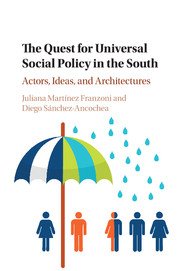Book contents
- Frontmatter
- Contents
- List of Figures
- List of Tables
- Acknowledgements
- List of Abbreviations
- Part I Universalism in the South
- Part II A Comparative Study of Policy Architectures
- Part III Building Universalism in Costa Rica
- 5 The Foundations of the Policy Architecture in the 1940s
- 6 Moving Further Towards Unification in the 1970s
- 7 Contradictory Moves under Market Pressures since the 1980s
- Part IV Conclusions
- References
- Index
7 - Contradictory Moves under Market Pressures since the 1980s
from Part III - Building Universalism in Costa Rica
Published online by Cambridge University Press: 10 November 2016
- Frontmatter
- Contents
- List of Figures
- List of Tables
- Acknowledgements
- List of Abbreviations
- Part I Universalism in the South
- Part II A Comparative Study of Policy Architectures
- Part III Building Universalism in Costa Rica
- 5 The Foundations of the Policy Architecture in the 1940s
- 6 Moving Further Towards Unification in the 1970s
- 7 Contradictory Moves under Market Pressures since the 1980s
- Part IV Conclusions
- References
- Index
Summary
Introduction
Maintaining a pro-universal architecture became harder after 1980. Economically, the debt crisis hit Costa Rica earlier than any other Latin American country and abruptly diminished resources for social policy. Politically, the dominance of social democracy weakened: during the late 1980s the Partido Liberación Nacional (National Liberation Party, PLN) moved towards the center as its conservative wing became more influential and the right-of-center Partido Unidad Social-Cristiana won three of the four presidential elections held between 1990 and 2006. Internationally, ideas advocating state downsizing – as reflected by the World Bank-led structural adjustment loans – gained momentum.
Despite these obstacles, Costa Rica's policy architecture has remained relatively stable in terms of eligibility, funding, entitlements, and service provision. In 2013 social insurance was still funded with payroll taxes and spending in health care and pensions represented more than 10 percent of GDP. Solidarity endured: by the mid-2000s, around half of all contributions made by formal workers went to fund health care services for pensioners, independent workers, and poor families (Gottret, Schieber, and Waters, 2008). The top 20 percent of contributors accounted for almost half of the Caja's income (Estado de la Nación, 2005, cited in Sáenz et al., 2011). Most medical facilities have stayed public and Costa Rica still guarantees an open basket defined by the public sector. Moreover, additional reforms during this period further unified the policy architecture: primary care services expanded nationwide and health care and pension insurance for the self-employed became mandatory.
Nevertheless, policy outputs are less universal today than they were two or three decades ago, primarily due to lessening quality and growing inequality in service provision. The outside option – the fifth component of the policy architecture – is largely responsible. The growth of private services and the spread of conflicting dual practices among CCSS doctors have threatened the other four components.
How can we explain the formal stability of four components of the architecture along with the growth of the outside option? The usual suspects of democratic institutions, social mobilization, and partisan ideology lack explanatory power. Policy changes in primary health care actually began under President Calderón Fournier (who otherwise pursued a pro-market policy agenda) and went unchallenged by other conservative administrations.
- Type
- Chapter
- Information
- The Quest for Universal Social Policy in the SouthActors, Ideas and Architectures, pp. 151 - 182Publisher: Cambridge University PressPrint publication year: 2016



